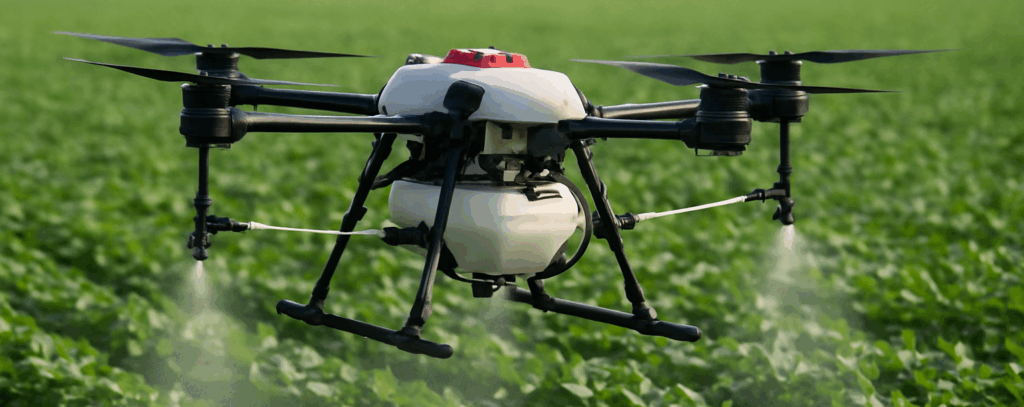Table of Contents
Toggle- The Shift from Traditional Crop Dusting to Drone-Assisted Agriculture
- Benefits of Agricultural Drone Services
- Integrating Data and Precision Agriculture
- Overcoming Barriers to Adoption
- The Future of Farming with Drone Technology
- Taking the Next Step in Precision Agriculture
- From Fields to Flight: A New Era for Agriculture
The agricultural industry is evolving rapidly, driven by the need for increased efficiency, sustainable practices, and precision-based solutions. Among the most groundbreaking advancements is the use of drones in farming, particularly for crop dusting, monitoring, and targeted spraying. As farmers face mounting challenges such as labor shortages, rising costs, and environmental pressures, agricultural drone services are emerging as a transformative tool for modern agriculture. Companies like Precision Agri Spray are leading the way, offering innovative solutions that maximize yields while minimizing waste.
The Shift from Traditional Crop Dusting to Drone-Assisted Agriculture
For decades, crop dusting relied heavily on manned aircraft, requiring significant fuel, manpower, and safety considerations. While effective for large-scale operations, these traditional methods often led to over-application of chemicals, uneven coverage, and environmental concerns. The introduction of drones into this space has completely redefined what’s possible in aerial spraying. Agricultural drones can fly closer to crops, deliver precise amounts of fertilizer or pesticides, and even adapt spray patterns based on real-time data.
Why Drones Outperform Traditional Methods
Drones excel where traditional methods fall short. Their compact size allows them to access hard-to-reach areas without damaging crops. They operate autonomously, reducing the need for large crews, and their software integration allows for accurate mapping of fields. Most importantly, they use targeted application techniques, ensuring chemicals are used efficiently and responsibly.
Benefits of Agricultural Drone Services
Farmers adopting drone technology are seeing a range of benefits, from improved productivity to significant cost savings. The precision of drone spraying reduces chemical usage, cutting costs and lowering environmental impact. Drones also enable more frequent monitoring of crop health, allowing early detection of pests or diseases before they spread. This early intervention translates directly into higher yields and healthier plants.
Increased Efficiency
Drone crop dusting can cover acres of farmland in a fraction of the time required by ground equipment. This speed is critical during peak growing seasons when timing can make or break a harvest.
Environmental Responsibility
By applying only the necessary amount of chemicals and targeting affected areas, drones help farmers meet sustainability goals while protecting surrounding ecosystems. For farmers committed to sustainable agriculture, this technology offers a measurable way to reduce environmental impact.
Integrating Data and Precision Agriculture
Modern agricultural drones are equipped with advanced sensors and cameras that gather valuable data on crop health, soil conditions, and nutrient levels. This integration of aerial imaging and precision agriculture enables farmers to make informed decisions that improve both productivity and profitability. Companies like Precision Agri Spray offer services that combine spraying with data-driven insights, empowering farmers to manage their land with unprecedented accuracy.
Mapping and Analysis Capabilities
Drones can create high-resolution maps of fields, highlighting areas that require attention. This information not only guides spraying but also supports long-term planning and crop rotation strategies.
Overcoming Barriers to Adoption
Despite the clear benefits, some farmers remain hesitant to adopt drone technology. Common concerns include regulatory requirements, training needs, and upfront costs. However, service providers such as Precision Agri Spray offer turnkey solutions that remove many of these barriers. By providing experienced pilots, compliance expertise, and state-of-the-art equipment, they make it easier for farmers to access the advantages of drone crop dusting without navigating the complexities alone.
Addressing Cost Concerns
While purchasing drones outright can be expensive, many farmers opt for service-based models, allowing them to benefit from the technology without the full investment. Over time, the savings from reduced chemical use and improved yields often outweigh the service costs.
The Future of Farming with Drone Technology
As drone technology continues to advance, its role in agriculture is expected to expand. Future innovations may include AI-driven crop analysis, automated disease detection, and even integration with autonomous ground vehicles for fully automated farm management. Farmers who embrace this shift early will have a competitive edge in both yield and sustainability.
Expanding Applications
Beyond spraying, drones are being used for planting seeds, monitoring livestock, and even assisting in irrigation planning. This versatility makes them an indispensable tool for modern farms of all sizes.
Taking the Next Step in Precision Agriculture
For farmers ready to modernize their operations, agricultural drone services offer a practical, high-impact entry point into precision farming. Whether for targeted crop dusting, field mapping, or ongoing health monitoring, drones deliver measurable results. To explore how drone crop dusting can transform your farm, check out Precision Agri Spray and learn how their tailored solutions can meet your unique needs.
If you want to see the difference in action, visit https://precisionagrispray.com/ and find out more about their cutting-edge agricultural drone services. The future of farming is here—and it’s taking flight.
From Fields to Flight: A New Era for Agriculture
The adoption of drone technology in agriculture isn’t just about keeping up with trends; it’s about embracing a smarter, more efficient way of working the land. As environmental regulations tighten and market demands increase, the ability to produce more with fewer resources becomes essential. With expert service providers like Precision Agri Spray leading the charge, farmers can confidently step into this new era of farming—one where precision, sustainability, and profitability go hand in hand.
